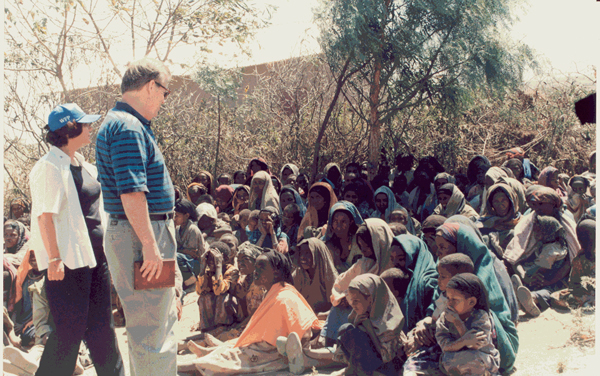
Tony Hall was in the Darfur region of Sudan last week visiting squalid refugee camps teeming with people who are barely being fed and who live in constant fear
Hall finds facts in Sudan aren't changing
By the Dayton Daily News
Tony Hall was in the Darfur region of Sudan last week visiting squalid refugee camps teeming with people who are barely being fed and who live in constant fear.
As the Bush administration's ambassador to the United Nations food agencies, Mr. Hall couldn't be kept out. He saw abject suffering and heard grisly stories of government-sponsored terror against black African farmers who rebelled against the Arab-dominated government. Now Ambassador Hall, who formerly was Dayton's longtime congressman, will file a report to Washington detailing the misery.
But there will be little that the Bush administration hasn't heard before. The scale of the inhumanity in Darfur is known. In a region the size of Texas, almost half of the 3.5 million people living there have been displaced. Since February of last year, an estimated 70,000 people have died, but that number is most likely a huge undercount. It doesn't include all the deaths stemming from raids on villages by the Arab militias that have been armed by the government. They ride into villages shooting, then burn the people's homes and crops, and rape women who don't get away.
Even in the refugee camps, women are not safe. To cook their meals, they have to scavenge for firewood. Because the areas around the camps have been picked dry, they have to venture farther, while so-called janjaweed soldiers await them.
Depending on how long the refugees are kept away from their homes, depending on how difficult the Sudanese government makes it for heroic relief workers to bring in food, hundreds of thousands of people could die before the crisis is under control.
The United Nations and this country have waited long enough for Sudan's government to end its murderous policies. That body — and this country, which is the largest aid donor to Sudan — have leverage even if there are problems associated with using it.
China, for instance, which sits on the U.N. Security Council and gets much of its oil from the Sudan, has promised to veto any U.N.-imposed sanctions. Meanwhile, the Bush administration thinks the Sudanese government is ready to end a 21-year civil war between the Arabs of the north and the Christian and animist southern rebels; it doesn't want to jeopardize that possible settlement by getting too tough on Khartoum.
But the suffering in Darfur is mounting exponentially, and Sudan's leaders are mocking the civilized world. They're promising to stop the janjaweed, but they're not even trying.
In September, Secretary of State Colin Powell reluctantly accused Sudan of genocide, thinking that condemnation would embarrass the country or frighten it. But these people apparently cannot be shamed.
Sudan has to be made to pay a price for its policies, even if the penalty isn't all it could be. Individual countries that are tired of seeing the suffering can step up on their own. They can seize assets, limit trade and generally isolate the country. And they can call on the African Union, which has some troops in Sudan, to give its soldiers a broader mandate. The troops have to be allowed to keep the peace, and there have to be more of them on the ground.
Ambassador Hall now has witnessed, firsthand, government-backed inhumanity. But action from this country and others — not more evidence — is what's needed to save people's lives.






